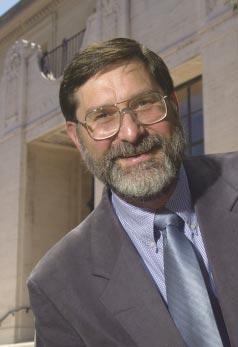
2 minute read
A Note from the Dean
THE COLLEGE OF NATURAL RESOURCES: AN ONGOING,SUCCESSFUL EXPERIMENT
Shortlyafter 9:00 a.m. on July1, 1974, the first meeting of the facultyof the College of Natural Resources was called to order in Birge Hall byChairman RudyF. Grah. Among the announcements were the selection of Loy L. Sammet as Acting Dean of the newcollege and the reading of a directive byChancellor Bowker establishing the College of Natural Resources, and designating Giannini Hall as its administrative home. Chancellor Bowkerís directive was the culmination of at least three years of work bythe College of Natural Resources Organizing Committee, chaired byprofessors J. N. Boles and Grah. The merger of the College of Agricultural Sciences with the School of Forestryand Conservation to create CNR had its roots in the Berkeleycampusís Revised Academic Plan of 1969-1975, which called for their ìintegration into a comprehensive educational program dedicated to the exploration of land resource questions.î
Advertisement

John Zivnuska and E. G. Linsley, the last deans of Forestryand Agricultural Sciences respectively, forged a remarkable collaboration to bring forth a college that would respond to the environmental and resource issues of the state. Suggested names for the newcollege included ìThe College of Renewable Resource Managementîand ìThe College of BioResources.îIn hindsight, neither of these seems as appropriate as the one selected. The College of Natural Resources has grown into its name and its roleóon the Berkeleycampus, within the UC system, and nationally.
Manyof the production aspects of agriculture had been transferred to the Davis campus, but Berkeleycontinued at that time and continues todayto playa vital role in resource issues related to agricultural lands and the entire resource base of the state. Without the foresight of Zivnuska, Linsley, Boles, Grah, and manyother College and Universityleaders, it is unlikelythat a department such as Environmental Science, Policy, and Management could have been imagined or formed in the reorganization of CNR that took place a dozen years ago. Similarly, our departments of Plant and Microbial Biology, Agricultural and Resource Economics, and Nutritional Sciences and Toxicologyare recognized leaders in their fields and at Berkeley.
Today, our college remains an experiment. New majors in Molecular Toxicology, Microbial Biology, Environmental Sciences, and Molecular Environmental Biologyhave been added to provide students with training for an ever-changing world. Our Environmental Economics and Policymajor has been opened up to students from the College of Letters and Sciences. CNR has just hired the first professor of bioethics at the Berkeley campus. These changes will ensure that the College continues to attract the finest students.
While College leaders at the time of the formation of CNR could not have anticipated the advances in genetics, remote sensing, economic theory, and nutrition that have occurred, theydid recognize that change is a constant, and theydesigned a college to embrace whatever changes occurred. They could not have anticipated the controversies over GMOs, the role of corporate funding in research, or forest and fire management practices, but theyrecognized that Berkeleyis a place where all sides are heard, issues are debated, and ideas are molded. Theycould not have imagined the cycles of budget difficulties that have left the College with far fewer financial resources, but theyinfused a culture of excellence and scholarship that survives those challenges.
The experiment continues, and CNR, with its roots as the first college of the UC Berkeley campus, continues to reshape itself to serve the students and the citizens of California. Zivnuska imagined a college that would ìembrace the environment in which man lives and the biological, technical, and social processes that man uses to produce the food, fiber, and other materials that he requires.î
Were he looking today, he would note that more than half of our students are not ìhe,î but ìshe,îand that the College serves all of humankind. And he would be proud.




